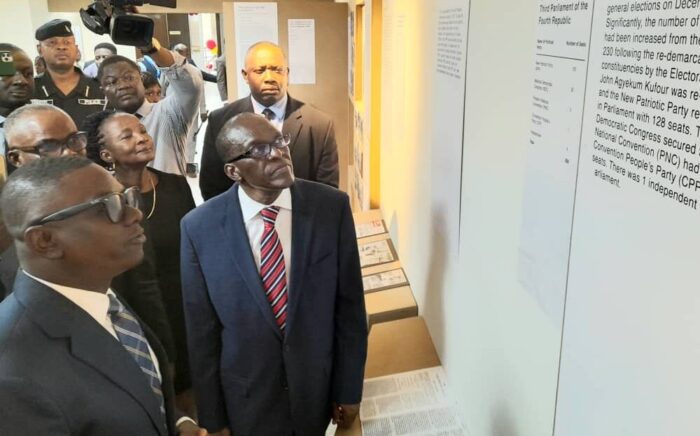Speaker of Parliament, Rt. Hon. Alban Sumana Kingsford Bagbin has commissioned the Parliament of Ghana Museum, a landmark institution celebrating the nation’s rich political history, and hailed it as a testament to Ghana’s democratic evolution, resilience, and cultural identity.
The museum, he said, stands as a statement not only to the pillars of democracy that support Ghana’s way of governance but also to the enduring spirit of Ghanaian tradition and identity forged through ages past.
Addressing the commissioning on Monday, January 6, 2025, Mr. Bagbin emphasized the critical role history plays in shaping national identity and governance.
Quoting Robert Heinlein, he remarked, “A generation which ignores history has no past and no future.” He also invoked Nelson Mandela’s words, highlighting the profound power of Ghana’s rich cultural heritage in nation-building.
Preserving history, building the future
The Speaker traced Ghana’s political journey, starting with the pre-colonial era, and continuing through the arrival of European explorers in 1471 when the Portuguese named the region “Del Minar” (Land of Mines). He pointed to key historical moments, such as the transatlantic slave trade, colonial rule, independence in 1957, and attaining republican status in 1960.
Reflecting on the collective effort that produced the enduring 1992 Constitution, Hon. Bagbin stated, “The reason the 1992 Constitution has lasted 32 years is that it was a product of collective effort, giving Ghanaians a sense of ownership that has kept us united.”
Features of the museum
Housed within the precincts of Parliament, the Parliament Museum chronicles Ghana’s legislative journey, from establishing the Legislative Council in 1866 to the modern-day parliamentary democracy.
The museum features curated artifacts, including gowns, wigs, press materials, and QR-coded biographies of significant historical figures, enhancing visitors’ experiences.
Head-and-shoulder portraits of all speakers, from the Gold Coast era to present-day Ghana, are prominently displayed.
Acting Clerk to Parliament, Ebenezer Ahumah Djietror, in his welcoming remarks commended the leadership of Parliament for their unwavering support.
“The commissioning of this museum at the twilight of the 9th Parliament is most appropriate. It serves as a constant reminder to uphold and preserve our democratic values for the benefit of posterity,” he said.
Chairman of the Museum Committee, Richard Kwame Acheampong, recounted the rigorous two-year journey to bring the project to life. He highlighted benchmarking visits to India, Japan, and the United States, which inspired the integration of technology and artifacts to tell compelling stories.
“This museum is a testament to the sacrifices of our forebears and a responsibility for the present generation to protect the gains of Ghana’s democracy,” Acheampong affirmed.
The Parliament of Ghana Museum is set to inspire patriotism, deepen citizens’ appreciation of the democratic process, and serve as a clarion call for Ghanaians to participate in and actively protect parliamentary democracy.


